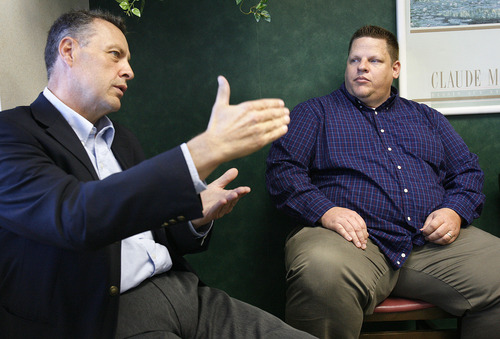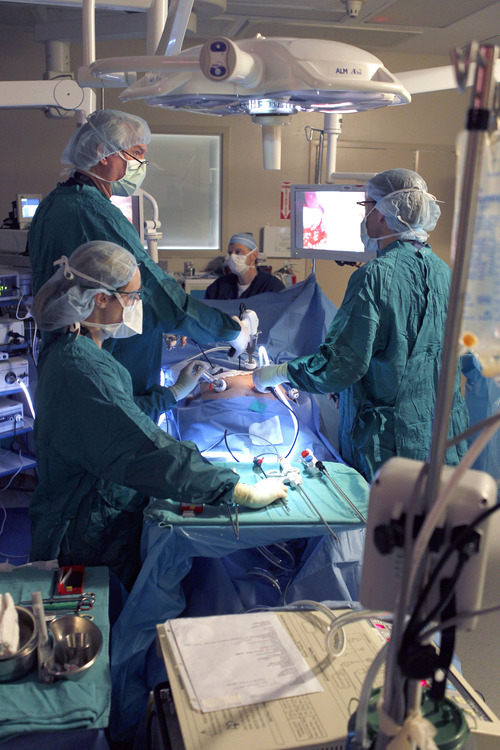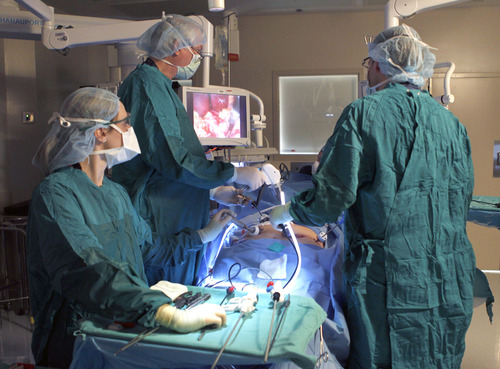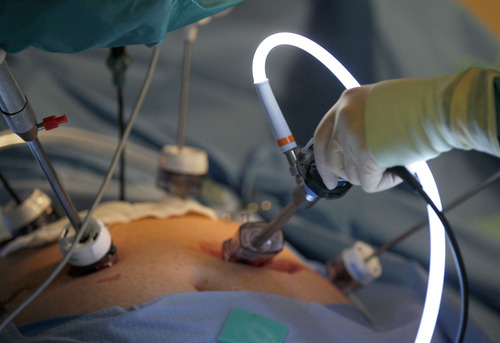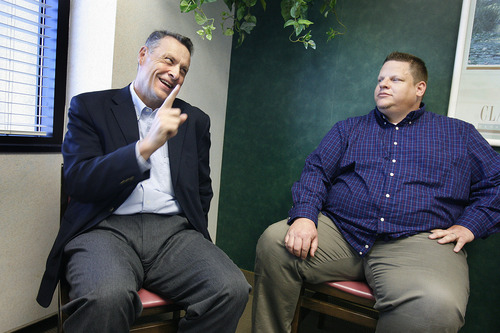This is an archived article that was published on sltrib.com in 2013, and information in the article may be outdated. It is provided only for personal research purposes and may not be reprinted.
Lehi >> Darren King hunkers down on the grass, his boys leapfrogging over him at a neighborhood park.
They roughhouse and chat about school — routine family stuff that King counts among the most cherished, "non-scale" benefits of his weight-loss surgery.
In 13 months King has shed 165 pounds and is down to his "fighting weight" of 244 from a high of 409. He hits the gym regularly, no longer suffers from obesity-related ailments and performs better at work.
But little of this factors into the "return on investment" calculations that insurance companies make in deciding whether to cover the procedure, leaving a sparingly used, but powerful, weapon in America's obesity battle off limits to some patients.
"There is some controversy over whether bariatric surgery reduces patients' medical costs compared to severely obese individuals who don't have the surgery," said Ted Adams, a professor in the Division of Cardiovascular Genetics at the University of Utah School of Medicine.
Research has shown weight-loss surgery combats not just obesity, but heart disease, strokes and diabetes. As a result, more and more insurance plans, including Medicaid and Medicare, are covering the procedures, albeit with restrictions attached.
Adams authored one of the longer-term studies of patients, which showed 60 percent remained diabetes-free six years after surgery.
Not all private insurers, however, are convinced and federal health reform won't improve the coverage landscape. The essential benefits package, or list of must-have benefits for health plans sold on Utah's health exchange, excludes weight-loss surgery.
Insurers want to know how soon they'll recoup the $28,000 average cost for the surgery. Is it a two-year or four-year return on investment, or longer?
Most studies show a reduction in prescription costs and office visits as patients take off the pounds, said Adams. Others show no decrease in hospital costs, due to surgical complications, repeat procedures and patients trading obesity-related health woes for others, he said.
Many doctors, though, say insurers should look at cost effectiveness and not cost.
"When a person needs heart surgery, no one asks, 'Will we break even on our investment?' " said Adams.
Of course, heart surgery has saved lives for decades. More evidence is needed of the lasting benefits of weight loss surgery, he said.
But without blinking, insurers pay tens of thousands of dollars for chemotherapy drugs to prolong patients' lives by a few years, raising the question: What's the value of a year of life saved?
It's a question faced by employers, too, said Adams, who works part-time at LDS Hospital's Live Well Center, which helps companies build wellness plans.
"They almost always ask, 'If we pump more money into this program, will we save money? Will our employees cost us less?' " he said. "Some companies won't invest in that kind of thing because they know their employees will turn over and it takes several years to see a return on investment."
Anecdotes don't trump science, but King's own wallet has gotten fatter as he's gotten skinnier.
His April 2012 gastric bypass surgery was donated by the doctor who performed it, Steven Simper at Rocky Mountain Associated Physicians. The hospital fees and other costs were covered by a grant from the Weight Loss Surgery Foundation of America.
"I'm forever grateful. That surgery changed my life," said King, who no longer takes anti-depressants or medication to control his blood pressure and cholesterol.
"The only time I've been to the doctor is for surgical follow-ups. I'm healthier than I've ever been," he said.
He almost never calls in sick to work and has received three promotions in a year.
"I hear from people now, 'You carry yourself differently.' Before I was really insecure about who I was and how people saw me."
King also figures he spends 70 percent less on dining out.
This is not to say surgery is for everybody. "Some people think it's the easy way out, but no way is it easy," said King.
There are several forms of bariatric surgery. King opted for gastric bypass, which is permanent. Simper divided his stomach into a small upper pouch and lower remnant pouch, shrinking the functional part of his stomach.
One week post-op King still hadn't gotten used to what he could digest without terrible gas pains, nausea or diarrhea.
"I decided to be a smart guy and fry an egg. I took two bites and got sick," he said in one of the YouTube videos chronicling his experience.
Sugar and complex carbohydrates were off limits, which meant no sweets, no soda, alcohol, pasta, rice, chips or bread. Even something as seemingly healthy as mozzarella cheese in a Caprese salad would make him retch.
"I just got depressed and thought, 'Man, there's nothing I can eat.' I'm living on protein drinks, vitamins and sugar-free popsicles," he recalled.
By week five he had dropped 65 pounds. By week 10 he had lost 95, but he was getting used to his diet and began hitting the gym.
Those rocky early days were necessary, King believes, to teach him new eating habits. He expects his diet to forever consist of water, protein shakes and a fist-sized nightly portion of lean meat and fresh vegetables or fruit.
The toughest changes have been interpersonal, he said, explaining how seeing him so physically altered was challenging for some of the people closest to him. King is recently separated from his wife.
But the surgery has brought peace of mind to the 42-year-old father of four and his sons.
"Before surgery I was literally having nightmares that I had died and left them with nothing," he said, remembering how a race to the car one evening, several weeks post-op, brought tears to his youngest son's eyes.
"I turned to him and said, 'What's wrong?' My son said, 'Dad, I can't believe you're running with me,' " King recalls. "I guess I underestimated how much it would also mean to them."


